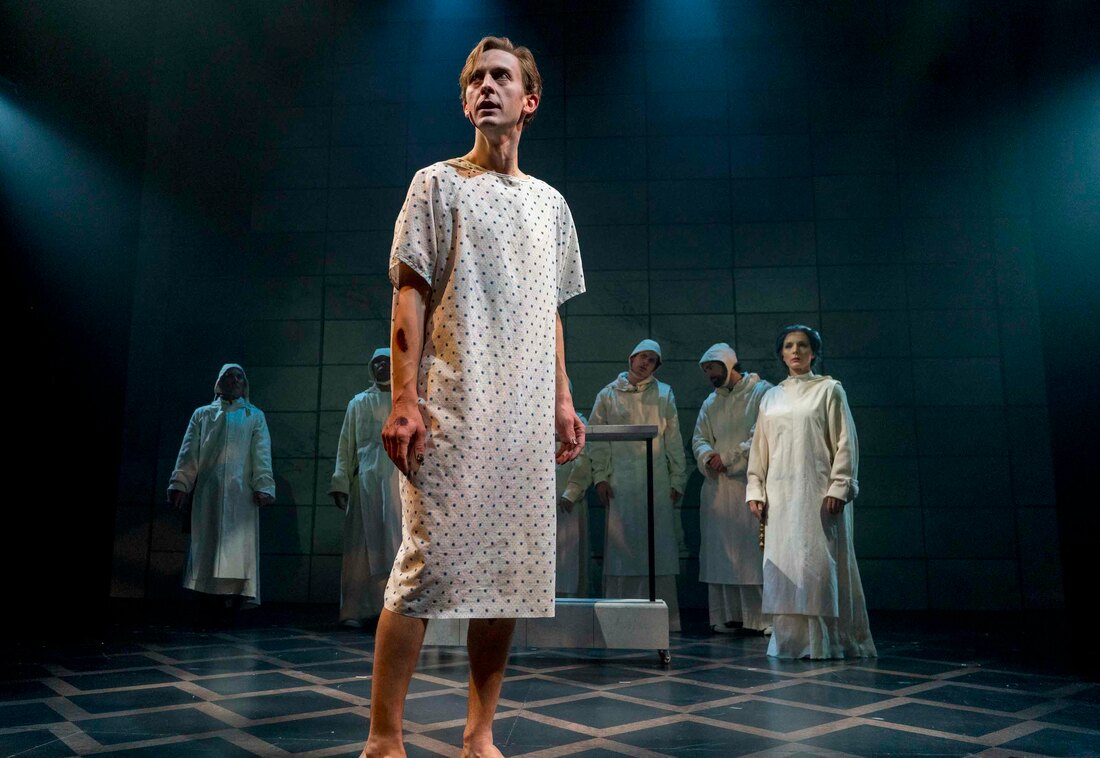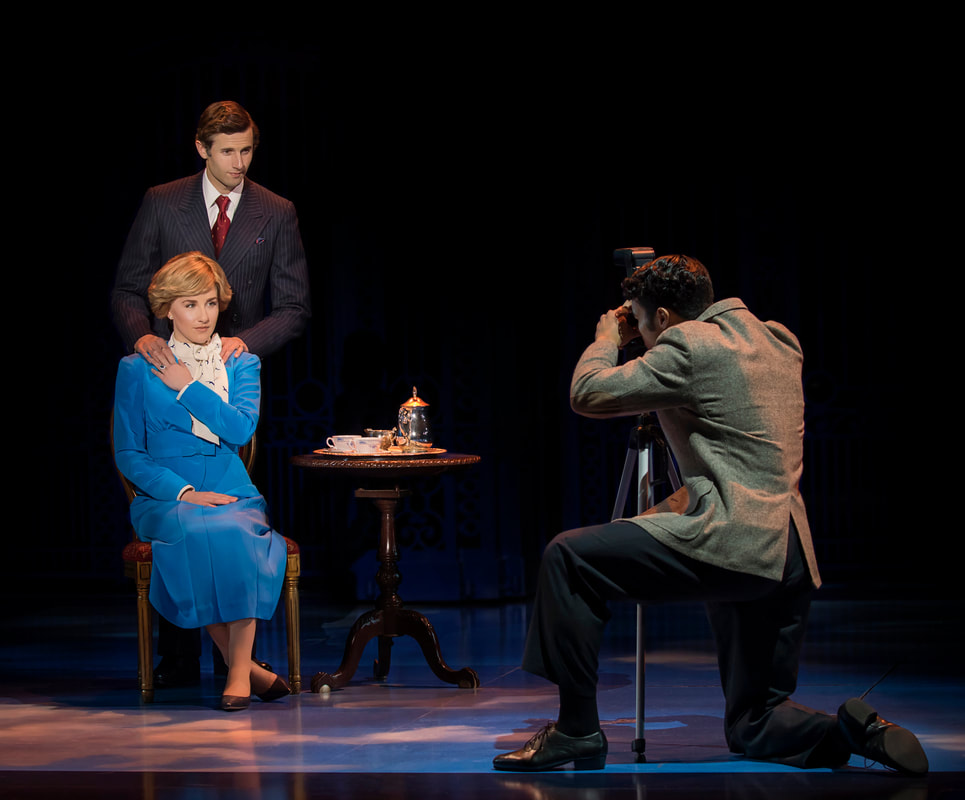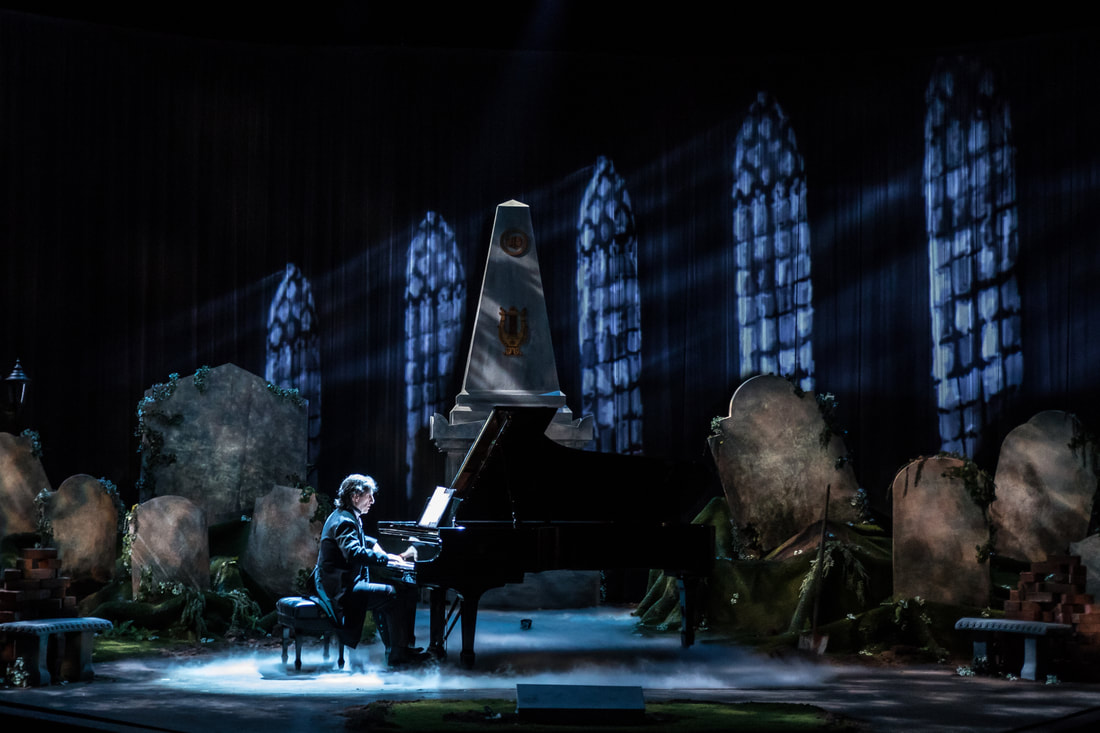|
Alex Bodine in "Angels in America" at Cygnet Theatre. Photo by Daren Scott For its annual presentation of two shows in rotating repertory, Cygnet Theatre is staging a 25th-anniversary production of Tony Kushner’s epic Angels in America A Gay Fantasia on National Themes. The two-part masterpiece which, according to Cygnet program notes, Kushner pitched as being about “Mormons, Roy Cohn and AIDS,” gets an electrifying, all-out staging in Old Town with a strong cast directed by Sean Murray that includes Alex Bodine in the harrowing role of Prior Walter and James Newcomb as the despicable Cohn, both of whom are afflicted with the inscrutable and terrible virus.
Part One: Millennium Approaches, which establishes the characters who interweave in Reagan’s 1985 America, showcases Kushner’s dexterity of language and razor-sharp perception of the body politic of the time. (Parallels to the present day are eerily appropriate.) The coming millennium and the emerging horror of AIDS fill the air with fear and extreme anxiety. Besides the visceral performances of Bodine and Newcomb, Connor Sullivan stands out as the emotionally and sexually conflicted Joe Pitt, and Will Bethmann brings manic ferocity to the role of Louis Ironson, Prior’s over-intellectualizing lover. The sound effects sometimes accompanying the narrative can be jarring, but they do not overwhelm the urgency of the story. Part Two: Perestroika is definitely the lesser of the two halves, though not by much. Fantasy sequences (or are they?) and a feverish scene between Prior and The Angel (Debra Wanger) contribute touches of surrealism, while elsewhere Kushner injects notes of outright humor into the unfolding drama. Perestroika does provide key moments to shine for Rosina Reynolds, who beautifully plays multiple roles throughout both shows, and for Kevane La’Marr Coleman, who reprises the part of a nurse and friend to Prior that he played in bygone ion theatre’s superb 2011 production of Angels in America. The prolificacy of Kushner and the stamina of Cygnet’s ensemble (the two parts add up to between six and seven hours of live theater) combine for an emotionally exhausting but stalwart 25th-anniversary Angels in America. (Review originally published in San Diego CityBeat on 3/27/19.)
0 Comments
For a show with a limited premise –harried Brits forced to stand in for some Yank singers of cowboy ditties --- Chaps! packs plenty into its under two hours. The 1995 musical comedy by Jahnna Beecham and Malcolm Hillgartner melds Monty Python-like physical comedy and one-liners with “A Prairie Home Companion” folksiness, while paying tribute to singing cowpokes like Gene Autry. As if that weren’t enough, the story, set at a BBC radio studio in 1944, unfolds with the threat of German bombs bursting in air above.
Somehow, all this comes together at Lamb’s Players Theatre under the direction of Robert Smyth. It does so not because Chaps! is any great shakes, but because the production relies on what Lamb’s does so very well: builds shows around intimate live-musical performance. (Its Once was a highlight of San Diego-area theater in 2018, and even its year-end Festival of Christmas was a musical delight.) The songs of Chaps! composed by everyone from Roy Rogers to Johnny Mercer may not be everyone’s cup of tea: They include “Ragtime Cowboy Joe,” “I’m An Old Cowhand,” “Jingle, Jangle, Jingle,” and “Tumblin’ Tumbleweeds,” among others. But the actor-musicians in the cast – Steve Gouveia, Manny Fernandes, Caitie Grady and Charles Evans, Jr. – make the tunes a treat for even city slickers in the house. While the setup of Chaps! would have been sufficient for a 10-minute skit, there are enough comic antics to divert in between the musical numbers. The funniest sight gag finds Fernandes pretending to perform ventriloquism with Evans dressed up as his dummy. Evans is a scene-stealer throughout, whether during this shtick or as Miles Shadwell, the BBC studio’s anxious, asthmatic producer. It’s perhaps inevitable that in a comedy like this one, somebody would dress up in drag. Ross Hellwig, mustache be damned, dons the frippery of a saloon girl in Act 2. From the sidelines throughout, Arusi Santi provides cartoonish sound effects to create the impression that the “Tex Riley” show is happening on the radio, and Jeanne Reith’s western costumes for all are bright, bodacious and authentic. Chaps! is slightly frantic but sweet sounding and family friendly. Not even World War II intrudes. (Review originally published in San Diego CityBeat on 3/20/19.) As if the first year of college isn’t anxiety-inducing enough for California teen Lexi, she’s been sent off to the University of Connecticut by her mother with a cautionary urban legend planted in her head: there’s a serial killer with a hook for one hand who preys upon young women. Thanks, Mom.
Whether the murderous madman is real in UCSD MFA grad Lauren Yee’s “Hookman” is purposely ambiguous. But there’s no shortage of graphic evidence in the 2015 play that Yee has referred to as an “existentialist slasher comedy” that he exists, at the very least on the power of suggestion. Blood turns up everywhere – on clothing, on knives, on Lexi’s own hands. The Hookman, meanwhile, is a masked figure naturally dressed in black. Or is he just in Lexi's mind? San Diego State’s School of Theatre, Television and Film is staging “Hookman” in association with Moxie Theatre under the direction of Moxie’s executive artistic director, Jennifer Eve Thorn. All the “Hookman” actors and crew members are SDSU undergrads or graduate students. “Hookman,” was actually workshopped in 2012 at UCSD’s Baldwin New Play Festival, the same year Moxie produced Yee’s “A Man, His Wife, and His Hat” (since retitled “The Hatmaker’s Wife”). With all the stage blood and the one-act play’s cutting takes on college life, “Hookman” is undoubtedly a treat for the students involved. Kennedy Garcia, playing the lead role of Lexi, admirably carries the show, which is presented in SDSU’s rather awkward Experimental Theatre. Her fellow actors, for the most part, are mired in one-note “type” roles: the text-obsessed roommate, the self-involved blond girl, the slacker-sounding boyfriend. The one supporting character who seems like a real person is Lexi’s best friend, Jess (Dominique Payne). A California flashback to a drive the two are taking from In-N-Out to the movies is “Hookman’s” hook. Jess ends up dead, killed by: A drunk driver? A murderer? Lexi’s reckless driving? The scene plays out three times in the makeshift chassis of a car onstage. This ambiguity, it turns out, is necessary for Lexi’s self-examination and confrontation with her fragile psyche. Everything that goes down in “Hookman” in between these fateful car scenes, from a grisly murder (the show’s one true fright) to a quixotic encounter at a memorial for the dead Jess, is presented as enigmatic or surreal or both. Further roiling the waters are Yee’s built-in musings on misplaced victimization, responsibility and culpability, and the complexities in general of trying to find one’s place as a young woman in the micro-society of college, one that can be unjust, high-pressure and even predatory. (Lexi confides to Jess, in one driving flashback: “I think I was raped.”) For existential heft, Joan Didion’s “The Year of Magical Thinking” is repeatedly name-dropped, too. The issues raised are crucial ones, but there are way too many for a 70-minute play in which the visual effects inevitably cause the thoughtful reflections to lag by comparison. Ultimately, the answer to who or what the Hookman is will depend on which aspect of the production resonates most. (Review originally published in the San Diego Union-Tribune on 3/19/19.) Jeanna de Waal and Roe Hartampf in "Diana." Photo by Little Fang A spirit of rebellious fun envelops the world-premiere musical Diana, which the “People’s Princess” might have well appreciated. What in lesser hands could have been conceived as a pious bore is just the opposite in La Jolla Playhouse’s production written by Joe DiPietro and David Bryan. This “biopic” of a musical chronicles in whirlwind fashion (that’s saying something in a two-hour, 30-minute show) the life of Lady Diana Spencer/Princess Diana of Wales with tongue quite often in cheek. Whether it’s portraying the paparazzi in all its predation (the tune “Snap, Click”) or the liberated Di retaliation-dancing in her famous F-U dress (“The Dress”), this production directed by the Playhouse’s Christopher Ashley shines brightest when it’s not taking itself too seriously.
The book by DiPietro leans heavily on the first stage of Diana’s (Jeanna de Waal) life, from her meeting with Prince Charles (Roe Hartampf) through their storied wedding, the birth of William and Harry, and up to the point where the princess realizes that her marriage is a sham and that Charles’ true love is the married Camilla Parker Bowles (Erin Davie). The post-divorce years do show Diana’s humanitarian efforts, but there’s no mention of boyfriend Dodi Fayed, and the accident that ended her life is treated briefly and very tastefully. The musical score has its share of swelling ballads, to each of which the gifted de Waal brings credible passion. But the novelty numbers featuring the press and the dress, and one introducing the hunky James Hewitt with whom Diana had an affair, are the most memorable. Judy Kaye does double duty as Queen Elizabeth and romance novelist Barbara Cartland, soaring over the top in the latter role, but who cares? Yet every performance except for de Waal’s is arguably eclipsed by William Ivey Long’s costume design, which in its attention to historical authenticity will blow away Diana fanatics and lifetime royals watchers. With its gravitas taking a back seat to spectacle and flash, Diana may disappoint the reverent and the proprietary. For others who simply crave a couple hours of pure entertainment – Broadway, anyone? – this show is sure to please. Hershey Felder in "Hershey Felder, Beethoven." Photo courtesy of San Diego Repertory Theatre Much more than a kind of “Beethoven 101, “Hershey Felder’s one-man play with music (and what music!) is a thoughtfully immersive dramatization of the life of one of the world’s great musical geniuses. As he has done previously with other masters of the classical idiom (Tchaikovsky, Chopin, Liszt) and towering 20th century figures (George Gershwin, Irving Berlin, Leonard Bernstein), Felder combines theatrical narrative and performance on an impeccable Steinway to chilling effect. Hershey Felder, Beethoven at the San Diego Repertory Theatre under the direction of Joel Zwick is a swift (90 minutes) but revealing portrait of Ludwig van Beethoven in all his tortured complexity.
Felder based this show’s narrative on a text by Gerhard von Breuning, the son of Beethoven’s lifelong friend, Stephan von Breuning (though the two were estranged for years) and briefly a student of Beethoven’s. Felder portrays both Gerhard von Breuning and Beethoven during the hour and a half onstage. Through them, he recounts the turbulent life of one of classical music’s titans: Beethoven’s abiding passion for his craft, his intuition for innovation, his defiance of convention and, all too early in his career, the onset of deafness. Like with other Felder interpretations, this one transcends exposition because of the music. Among the beloved works of Beethoven performed are the “Emperor Concerto,” “Moonlight Sonata,” which Felder emphasizes was not a title chosen or favored by Beethoven, and, as a coda to the evening, “Fur Elise.” Despite all that’s been written about Beethoven in nearly 200 years, much of his life, and certainly his death, is shrouded in myth. But the fascination with Beethoven, whether it be among musicologists, musicians or simply those who are moved by the works he created, is more potent than legend. Still, it’s a stunning moment when, in depicting Beethoven’s last moments on Earth, Felder rises up from the deathbed and shakes his fist at the heavens. Even if apocryphal, it’s a depiction of a man whose fierce, unyielding spirit (and perhaps anger) left an indelible mark on a world that though it cheated him of happiness was the beneficiary of the beauty he gave it. (Review originally published in San Diego CityBeat on 3/6/19.) |
AuthorDavid L. Coddon is a Southern California theater critic. Archives
July 2024
Categories |
David Coddon |
|


